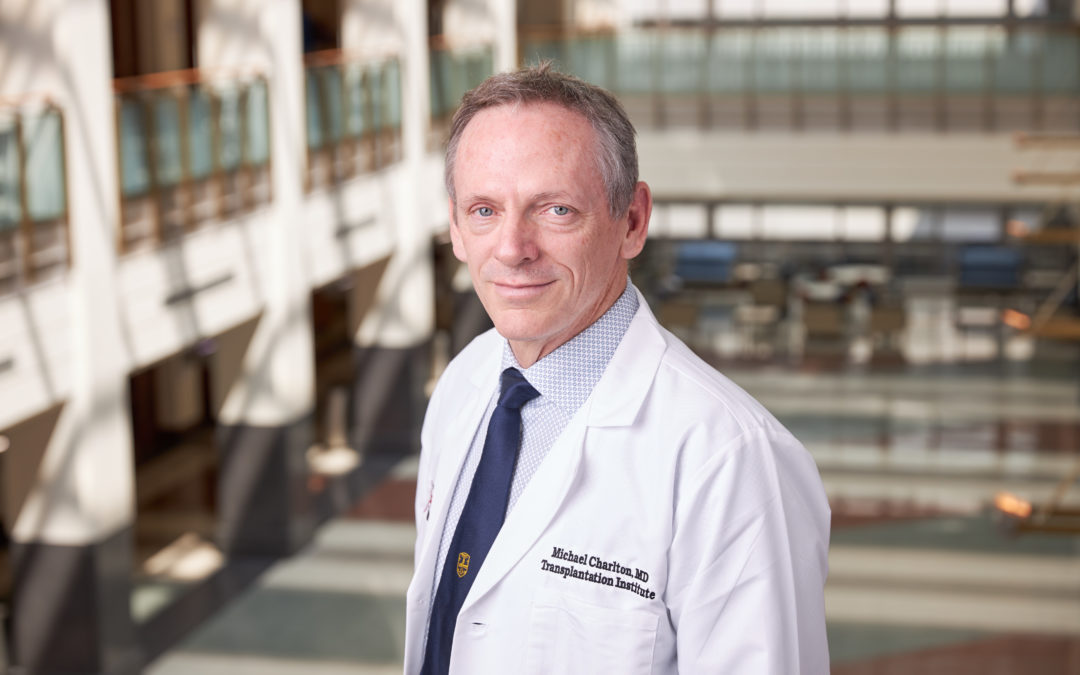“It’s important to me to prioritize research that has meaning for patients—work that will relieve patient suffering in reasonably short order,” says Michael Charlton, MBBS, Professor of Medicine.
An international expert in the study and treatment of liver disease and in liver transplantation, Dr. Charlton joined the University of Chicago Medicine in 2017, and currently serves as Director of the Center for Liver Diseases and Co-Director of the Transplant Institute. Under his guidance, the University of Chicago Medicine’s liver disease team has changed the trajectory of the lives of many patients with liver disease, liver cancer, biliary disease, and biliary cancer.
The intersection of these liver-related conditions with inflammatory bowel disease is a subject ripe for research, as one in four IBD patients has some form of liver disease. Because of its strengths in the research and treatment of IBD, the University of Chicago Medicine Digestive Diseases Center is especially well-positioned for investigation of this overlap.
“Dr. Rubin [the Center’s director] rightly recognized that the liver and the gastrointestinal tract are literally connected,” says Dr. Charlton. “They are not separable from each other; they are joined in multiple ways, and many patients with inflammatory bowel disease also have or are at risk for liver disease.”
Dr. Charlton appreciates how the GI Research Foundation support him and the Digestive Diseases Center in doing research that is “not only science or for science’s sake” but rather eases patient hardship: “The University of Chicago does this very well, and the GI Research Foundation has really enabled us to do research that is cutting edge.”
In the United States, thanks in part to new treatments for Hepatitis C, the most rapidly increasing liver disease is non-alcoholic steatohepatitis, also called fatty liver disease. Often difficult to diagnose and treat, fatty liver disease increases patients’ risk for developing cirrhosis and liver cancer over time.
Dr. Charlton explains how this relates to IBD patients: “The physiology of inflammatory bowel disease places patients at risk for fatty liver disease [and] not just primary liver cancer but also a separate type of cancer called cholangiocarcinoma or cancer for the bile ducts…. For bile duct cancer … and hepatocellular cancer [primary liver cancer], the overall five-year survival rate is about one in five people, which is terrible.”
What advice does Dr. Charlton have for patients? “Be engaged with your own health…. Be your own advocate.” He notes that people, despite increased use of social media and internet research, too often “accept illness and bad outcomes and frustration. They feel that how things are [is] the only way they can be. And we know that is simply just not always the case.”
To this point, he says, “I also have the happy experience of patients who say, ‘I saw Dr. John Fung, and he saved my sister’s life. We’d been told nothing could be done.’ I recently treated a patient with bile duct cancer who had been told his cancer was inoperable, and he came here and it was taken care of. With Dr. Rubin, we recently had a patient who failed multiple therapies for Crohn’s disease, and Dr. Rubin simply said, ‘We’ll get you into remission.’ He wasn’t just bragging; he did it. He’ll do what it takes. We have an imaginative, hard-working team prepared to deliver treatment and diagnosis, right at the cutting edge.”

